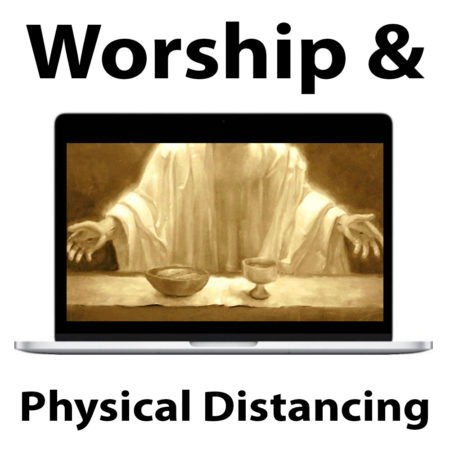Since the outpouring of the Holy Spirit at Pentecost, the gathering together of Jesus’s disciples for fellowship and worship has been an essential aspect of what it means to be the church.
They devoted themselves to the apostles’ teaching and to fellowship, to the breaking of bread and to prayer. Everyone was filled with awe at the many wonders and signs performed by the apostles. All the believers were together and had everything in common. They sold property and possessions to give to anyone who had need. Every day they continued to meet together in the temple courts. They broke bread in their homes and ate together with glad and sincere hearts, praising God and enjoying the favor of all the people. And the Lord added to their number daily those who were being saved. — Acts 2.42-47 (NIV)
Yet, today in the United States, many who profess to be followers of Jesus treat the public worship gathering as superfluous. We live busy lives, too busy for in-person worship. We also live in a technologically-rich era, when we can listen to musical worship and biblical teaching while we run on the treadmill at the gym or while we do the dishes. So what then is even the point of meeting in the same physical space for worship?
Last night, as many competing thoughts about worship swirled in my head, I sat down to continue reading Resilient Faith: How the Early Christian “Third Way” Changed the World by Gerald Sittser. As I opened the book, the chapter where I left off was simply titled “Worship.” (I’m listening, Lord) In it, he captures this important point:
We tend to view worship as one activity among many, taking its place alongside job, home, school, sport, and hobby. We ‘go to church’ in the same way we go to work or to the gym. Moreover, for many of us, religious devotion favors the personal and private—studying the Bible and praying, reading Christian books, listening to Christian music and podcasts, decorating our homes with Christian art—over the public and communal, probably because it is more convenient. Worship is an event that occurs for one hour on Sunday; it plays a fairly limited role in the lives of most Christians, including serious Christians. Our spotty attendance in worship is proof enough of that. When we do attend worship, we tend to approach it as consumers, expecting good music (according to our own tastes), an inspiring sermon, and friendly people.
Early Christians viewed worship as a communal discipline around which their lives were ordered and organized. It played a central role in the movement because it prepared them for the challenges of discipleship in the larger Roman world. […] Christians depended on worship; their world revolved around it; they committed themselves to the regular discipline of it. It was at the heart of of their faith, not simply one small expression of it, because worship ordered their lives around the center of life, the Triune God. They viewed worship as they did food and sleep and air. It was a spiritual necessity to them. Without it they put their spiritual lives at risk. (p.121)
In Western culture, we are conditioned to approach worship individualistically, but the Jesus Way was not developed in the modern West, but in the ancient Near East. Worship for Christians has always been communal, even when we have been forced to be apart from one another. The gathered and baptized disciples of Jesus, united in Word and Sacrament, is the body of Christ. Yet, we are able to maintain our connection now through virtual means, which aren’t ideal, but are a temporarily necessary measure. As Jonathan Warren P. Pagán writes,
Gathered worship in word and sacrament is therefore not an optional add-on for Christians. We cannot simply upload our worship online and expect that nothing will be lost. And yet to meet publicly now constitutes a massive public health risk, which is inconsistent with our duty to love our neighbors as ourselves.
We should suspend our gathered worship during this season and move to online formats so as to do our part for the common good, to ‘flatten the curve’ of this pandemic. But at the same time, we must regard the present crisis as an impairment in our communion with each other and with the Lord. It is something we should lament and mourn, both in our private devotions and in our online, virtual gatherings. This is not the way it’s supposed to be.(https://anglicanpastor.com/spiritual-communion-during-the-covid-19-pandemic/)
In this season of physical distancing, it is incumbent upon Jesus-disciples to resist the inclination to privatize our discipleship. Our worship will continue to be communal and we are still united in one body of Christ. This loss of in-person fellowship and worship is a loss. It is not how it’s supposed to be. Those who have for a long time wanted to disband the public gathering in favor of a privatized spirituality are out of sync with the rhythms of faith that have nourished the life of the church for millennia. However, those who stubbornly refuse to adapt to this crisis, putting our neighbors in dangers are out of step with how the church is called to lay down our lives for our neighbors.
This Lenten season offers us an opportunity to practice a different kind of fasting—a fasting that puts the public concern for the most vulnerable members of society before our own piety.
Is this the kind of fast I have chosen,
only a day for people to humble themselves?
Is it only for bowing one’s head like a reed
and for lying in sackcloth and ashes?
Is that what you call a fast,
a day acceptable to the Lord?
Is not this the kind of fasting I have chosen:
to loose the chains of injustice
and untie the cords of the yoke,
to set the oppressed free
and break every yoke?
—Isaiah 58.5-6 (NIV)
One of the best ways the church can serve our most vulnerable neighbors at this time is by not being a vector for further infections—to do our part to stem the tide of this pandemic. By moving our communal worship online, we serve our overwhelmed medical professionals and the overwhelmed hospitals they represent. By moving our communal worship online, we put the needs of others before our own. By moving our communal worship online, we are giving up something good in a similar way to a fast, in order to take hold of God in a new way. Perhaps this will renew our passion for in-person worship. As Esau Mccaulley reminds us:
The church’s absence, its literal emptying, can function as a symbol of its trust in God’s ability to meet us regardless of the location. The church remains the church whether gathered or scattered. It might also indirectly remind us of the gift of gathering that we too often take for granted.(https://www.nytimes.com/2020/03/14/opinion/coronavirus-church-close.html)


